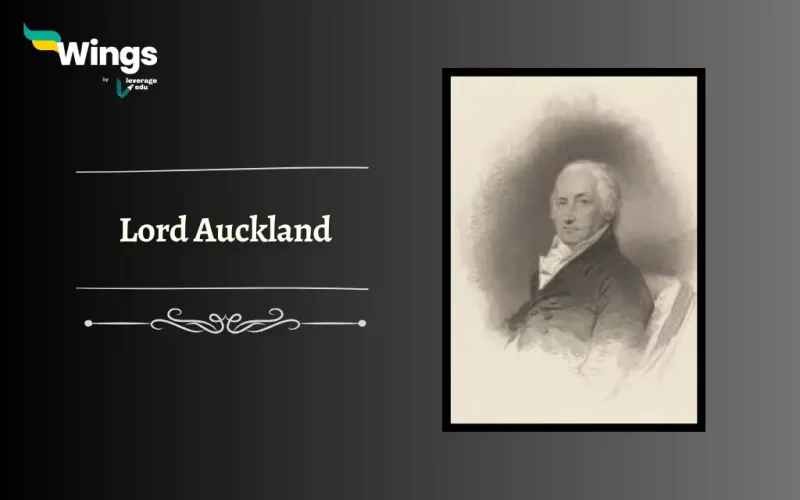Lord Auckland is also known as George Eden and played an important role in British India. As the Governor-General of India from 1836 to 1842, his tenure marked very significant events. From political developments, and military strategies to the growing influence of the British Empire, his contribution is significant in changing India’s fate. In this blog, we will learn more about him and his impact on the region of British India.
Early Life and Background of Lord Auckland
Table of Contents
George Eden was born in the year 1784 in Beckenham, Kent. He graduated from Eton and Christ Church, Oxford. Lord Auckland’s family ties to the influential Whig party paved the way for his political career. Auckland returned to parliament in 1810, succeeding his brother. He was a supporter of the reform party and succeeded his father in the barony and took the seat in the House of Lords. Later on, he was thrice the First Lord of the Admiralty.

What was the Role of Lord Auckland in India?
In 1836, Lord Auckland was appointed as the Governor-General of India by the British crown. His appointment came at a time when the British Raj sought to expand its territories and consolidate its power in the subcontinent. His mandate was clear – to safeguard British interests and to extend their control over the Indian territories.
Also Read: Who was the First Governor General of India?
Political Development under Lord Auckland
During his tenure, several significant political developments took place. Some of them are –
- The Great Game: The Great Game, a geopolitical rivalry and conflict between the British Empire and the Russian Empire for supremacy in Central Asia, originated in Afghanistan.
- Positioned between British India and Russia, Afghanistan became a focal point of the competition.
- Additionally, concerned about a potential Russian threat and influenced by Russia’s dominant status, the British sought to increase their involvement in Afghanistan.
- Concurrently, Dost Muhammad Khan aimed to regain control of Peshawar from Maharaja Ranjit Singh.
- Notably, the British were aligned with Maharaja Ranjit Singh in this complex political landscape.
- The Tripartite Treaty: Furthermore, Ranjit Singh, Shah Shuja, and Lord Auckland reached a three-party accord on the 26th of June 1838. In addition, the primary objective of this tripartite agreement was mutual assistance among the involved parties during challenging times.
- The First Anglo-Afghan War: The first war took place between 1838 to 1842. The British Empire was concerned about the Russian expansion in Central Asia and attempted to secure its influence in Afghanistan.
- Additionally, Auckland supported Shah Shuja, the former Afghan king against Dost Mohammad Khan which triggered the First Afghan War.
- Consequently, Lord Auckland’s perplexing strategy for the First Anglo-Afghan War led to the loss of numerous British (Indian) soldiers (around 20,000) and incurred a financial setback amounting to billions of rupees.
- Ultimately, Dost Mohammad gained recognition as the Emir of Afghanistan, and the British were compelled to enter into a humiliating treaty on his behalf.
- However, the war ended in a disaster for the British leading to their eventual withdrawal from Afghanistan.
- The Treaty of Lahore: The basis of the Anglo-Sikh friendship was rooted in the principle that “the enemy’s enemy is a friend.”
- The agreement between the British and Sikhs entailed a commitment to refrain from supporting each other’s adversaries and avoiding interference in each other’s affairs.
- However, this alliance endured until the death of Ranjit Singh in 1839.
- Lord Auckland faced a dilemma as he found himself unable to jeopardise Ranjit Singh’s position to gain the favour of Dost Mohammad Khan.
Military Strategies under Lord Auckland
Furthermore, Lord Auckland recognised the importance of military strategies in maintaining British dominance in India. Some notable military actions during his tenure include –
- Suppression of Maratha Confederacy: Lord Auckland played a very important role in suppressing the Maratha Confederacy which was a formidable opponent to British rule in India. The Defeat of the Marathas effectively weakened their resistance and solidified British control.
- Establishment of a strong British Army: The lord prioritized the modernization and strengthening of the British Indian Army. This included improving discipline, and introducing new weaponry and training techniques while building a strategic military infrastructure.
- Doctrine of Lapse: The policy period was mid-18th century to mid-19th century. Lord Auckland continued the policy and annexed several Indian states.
Also Read: What is the Difference Between Governor-General and Viceroy?
Lord Auckland’s tenure as the Governor-General of India marked a significant period in history. Despite facing challenges and setbacks his policies and strategies shaped the British Indian administration’s control and influence in the subcontinent. The empire faced opposition and resentment from local communities, rulers and even sections of the Indian population.
Relevant Blogs
| Lord Cornwallis | Lord Curzon |
| Lord Lansdowne | Lord Dalhousie |
| Lord Canning | Lord Amherst |
| Lord Macaulay | Lord Lytton |
| Lord Minto I | Lord William Bentinck |
| Lord Charles Metcalfe | Lord Irwin |
FAQs
George Eden, Earl of Auckland, was appointed as Governor-General in 1836 and served until 1842. During his tenure, the first Anglo-Afghan war took place. He is known for his efforts in expanding India’s commercial industry.
Lord Auckland became Governor-General of India in 1836 and worked to improve native schools and expand India’s commercial economy as a legislator.
First, they negotiated unsatisfactorily with Dost Mohammad. Then, Governor-General Lord Auckland ordered an invasion of Afghanistan to restore exiled Afghan ruler Shah Shuja to the throne.
We hope you liked what you read. If you want to read more articles like this you can visit our general knowledge page on Indian History!
 One app for all your study abroad needs
One app for all your study abroad needs













